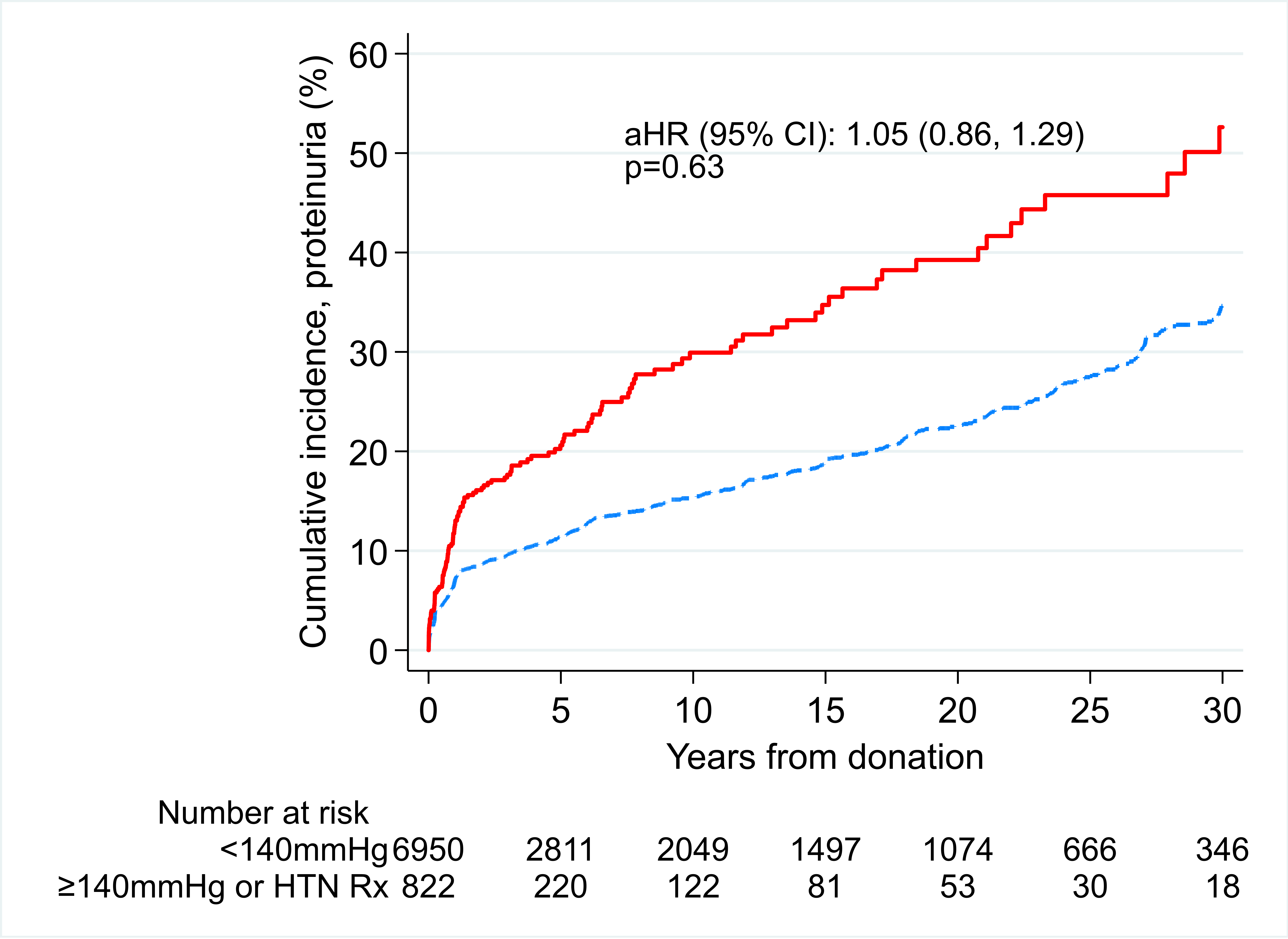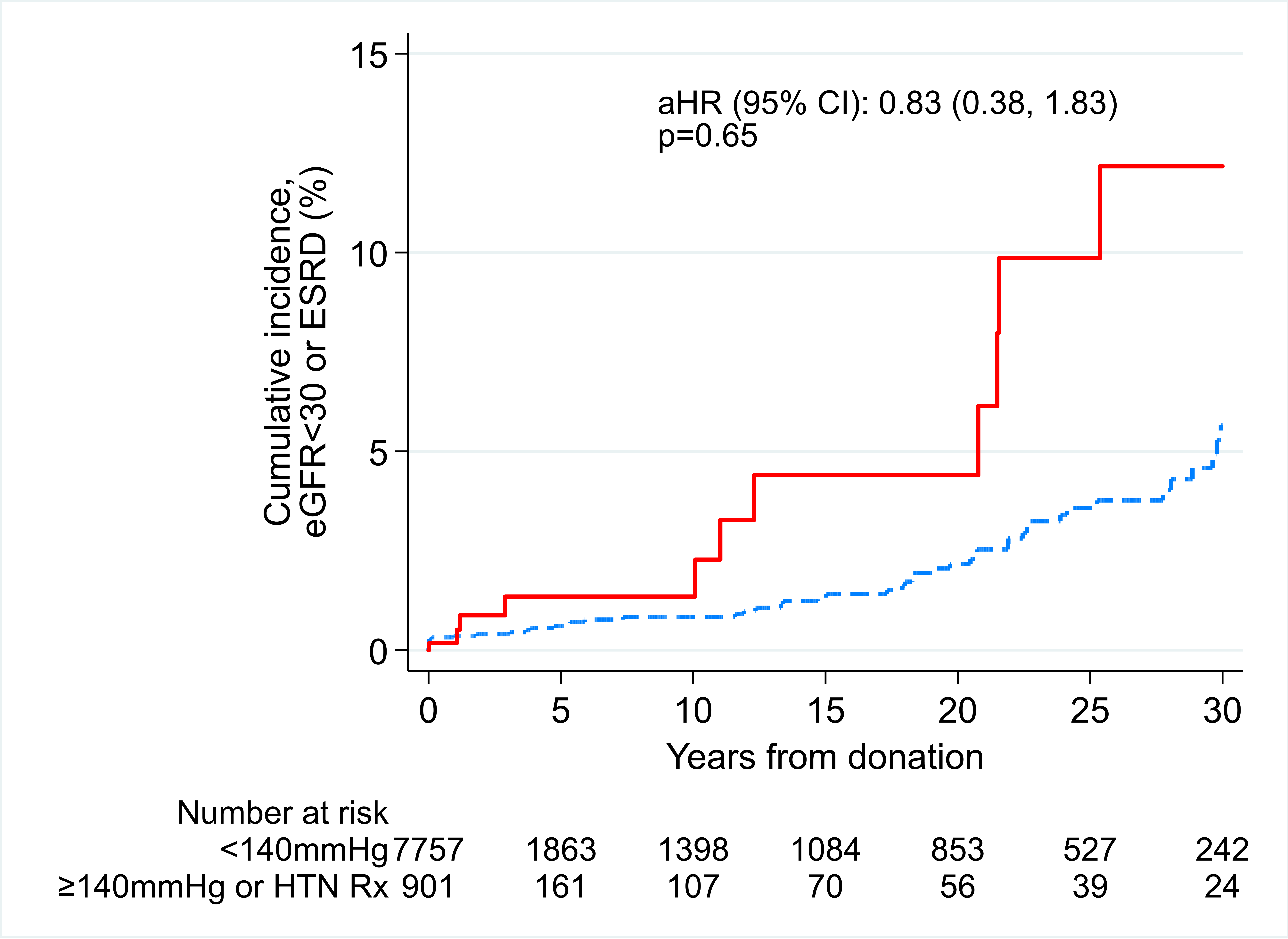Long Term Outcomes of Hypertensive Kidney Donors
Houston Methodist Hospital, Houston, TX
Meeting: 2020 American Transplant Congress
Abstract number: LB-010
Keywords: Donation, Hypertension, Kidney transplantation, Living donor
Session Information
Session Name: Poster Session A: Late Breaking
Session Type: Poster Session
Date: Saturday, May 30, 2020
Session Time: 3:15pm-4:00pm
 Presentation Time: 3:30pm-4:00pm
Presentation Time: 3:30pm-4:00pm
Location: Virtual
*Purpose: Many people with hypertension are excluded from kidney donation fearing that hypertension is a major cause of CKD and its impact maybe magnified after nephrectomy. Such practice is not fully supported by strong evidence and may deprive some the benefit of a live donor transplant.
*Methods: In a retrospective analysis of 8721 ethnically diverse kidney donors of whom 904 were hypertensive at donation, we compared long-term outcomes of hypertensive kidney donors to those without hypertension at the time of donation. All donations took place 1963-2007. Study outcomes were mortality, cardiovascular disease, proteinuria, and ESRD.
*Results: Median age was 39 years, 56.2% were women, 85% were non-Hispanic white, and 80.5% were related donors. At donation, 904 donors were hypertensive; receiving antihypertensive medications (n=251) or had a blood pressure >140/90 mmHg (n=653). Hypertensive donors were older, 58.2% were <50 years old and had a lower eGFR at donation. After 7 ±10 years, an additional 26% of donors developed hypertension. Donors with new hypertension were younger at donation and were less likely to be related to the recipient. The 30-year cumulative incidence of ESRD was 213/10000 in hypertensive donors vs. 342/10000 in normotensive donors. The multivariable risk of mortality, CVD and proteinuria were comparable in normotensive and hypertensive donors. In total, 5 hypertensive donors and 39 normotensive donors developed ESRD 19.2 ±10.3 years after donation, aHR 0.42 (0.08-2.07), p=.29 in the Cox model and aOR 1.04 (0.36-3.0), p=0.95 in the multiple regression model. Sensitivity analysis using the new definition of hypertension (>130/80) yielded similar results.
*Conclusions: Kidney donors with hypertension do not appear to incur higher mortality, CVD, or ESRD. Wider acceptance of well screened hypertensive kidney donors appears reasonable and could safely expand live donation.
| No HTN | HTN | ||||
| Outcomes | Time to event, years | n (%) | n (%) | Adjusted HR (95% CI) | p-value |
| Mortality | 22.2 (±9.3) | 341 (10.1) | 50 (17.8) | 0.73 (0.44, 1.24) | 0.25 |
| Cardiovascular Disease | 17.8 (±9.4) | 630 (18.8) | 78 (28.0) | 0.82 (0.55, 1.23) | 0.34 |
| Proteinuria | 15.3 (±10.3) | 472 (16.4) | 56 (24.2) | 1.21 (0.86, 1.69) | 0.28 |
| eGFR <30 or ESRD | 19.0 (+12.4) | 60 (1.8) | 13 (4.6) | 1.03 (0.44, 2.43) | 0.95 |
To cite this abstract in AMA style:
Ibrahim H, Hebert S, Adrogue HE, Nguyen DT, Graviss EA, Gaber A, Matas A. Long Term Outcomes of Hypertensive Kidney Donors [abstract]. Am J Transplant. 2020; 20 (suppl 3). https://atcmeetingabstracts.com/abstract/long-term-outcomes-of-hypertensive-kidney-donors/. Accessed July 12, 2025.« Back to 2020 American Transplant Congress


